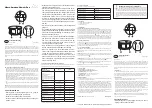
MAX-8 / MAX-M8 - Hardware Integration Manual
UBX-15030059 - R05
Product handling
Page 21 of 31
Production Information
•
Limit time above 217° C liquidus temperature: 40 – 60 s
•
Peak reflow temperature: 245° C
Cooling phase
A controlled cooling avoids negative metallurgical effects (solder becomes more brittle) of the solder
and possible mechanical tensions in the products. Controlled cooling helps to achieve bright solder
fillets with a good shape and low contact angle.
•
Temperature fall rate: max 4° C/s
☞
To avoid falling off, the u-blox 8 / M8 GNSS modules should be placed on the topside of the
motherboard during soldering.
The final soldering temperature chosen at the factory depends on additional external factors like
choice of soldering paste, size, thickness and properties of the baseboard, etc. Exceeding the
maximum soldering temperature in the recommended soldering profile may permanently damage the
module.
Figure 15: Recommended soldering profile
☞
u-blox 8 / M8 modules
must not
be soldered with a damp heat process.
Optical inspection
After soldering the u-blox 8 / M8 modules, consider an optical inspection step to check whether:
•
The module is properly aligned and centered over the pads
•
All pads are properly soldered
•
No excess solder has created contacts to neighboring pads, or possibly to pad stacks and vias
nearby
Cleaning
In general, cleaning the populated modules is strongly discouraged. Residues underneath the
modules cannot be easily removed with a washing process.
•
Cleaning with water will lead to capillary effects where water is absorbed in the gap between the
baseboard and the module. The combination of residues of soldering flux and encapsulated water
leads to short circuits or resistor-like interconnections between neighboring pads.
•
Cleaning with alcohol or other organic solvents can result in soldering flux residues flooding into
the two housings, areas that are not accessible for post-wash inspections. The solvent will also
damage the sticker and the ink-jet printed text.











































